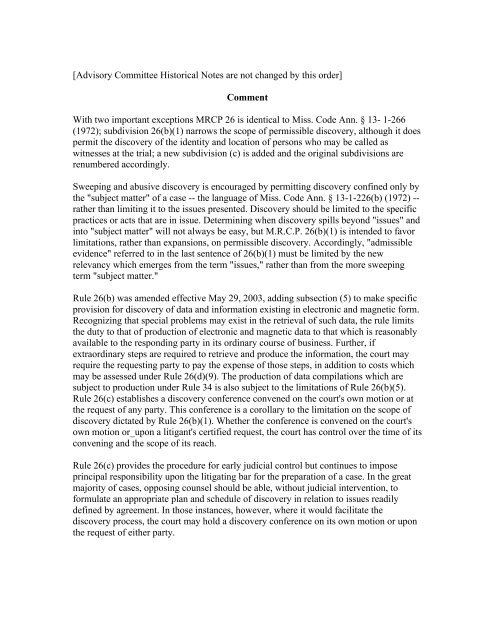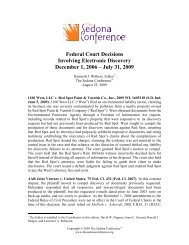Rule 26(b)(5)
Rule 26(b)(5)
Rule 26(b)(5)
Create successful ePaper yourself
Turn your PDF publications into a flip-book with our unique Google optimized e-Paper software.
[Advisory Committee Historical Notes are not changed by this order]<br />
Comment<br />
With two important exceptions MRCP <strong>26</strong> is identical to Miss. Code Ann. § 13- 1-<strong>26</strong>6<br />
(1972); subdivision <strong>26</strong>(b)(1) narrows the scope of permissible discovery, although it does<br />
permit the discovery of the identity and location of persons who may be called as<br />
witnesses at the trial; a new subdivision (c) is added and the original subdivisions are<br />
renumbered accordingly.<br />
Sweeping and abusive discovery is encouraged by permitting discovery confined only by<br />
the "subject matter" of a case -- the language of Miss. Code Ann. § 13-1-2<strong>26</strong>(b) (1972) -rather<br />
than limiting it to the issues presented. Discovery should be limited to the specific<br />
practices or acts that are in issue. Determining when discovery spills beyond "issues" and<br />
into "subject matter" will not always be easy, but M.R.C.P. <strong>26</strong>(b)(1) is intended to favor<br />
limitations, rather than expansions, on permissible discovery. Accordingly, "admissible<br />
evidence" referred to in the last sentence of <strong>26</strong>(b)(1) must be limited by the new<br />
relevancy which emerges from the term "issues," rather than from the more sweeping<br />
term "subject matter."<br />
<strong>Rule</strong> <strong>26</strong>(b) was amended effective May 29, 2003, adding subsection (5) to make specific<br />
provision for discovery of data and information existing in electronic and magnetic form.<br />
Recognizing that special problems may exist in the retrieval of such data, the rule limits<br />
the duty to that of production of electronic and magnetic data to that which is reasonably<br />
available to the responding party in its ordinary course of business. Further, if<br />
extraordinary steps are required to retrieve and produce the information, the court may<br />
require the requesting party to pay the expense of those steps, in addition to costs which<br />
may be assessed under <strong>Rule</strong> <strong>26</strong>(d)(9). The production of data compilations which are<br />
subject to production under <strong>Rule</strong> 34 is also subject to the limitations of <strong>Rule</strong> <strong>26</strong>(b)(5).<br />
<strong>Rule</strong> <strong>26</strong>(c) establishes a discovery conference convened on the court's own motion or at<br />
the request of any party. This conference is a corollary to the limitation on the scope of<br />
discovery dictated by <strong>Rule</strong> <strong>26</strong>(b)(1). Whether the conference is convened on the court's<br />
own motion or_upon a litigant's certified request, the court has control over the time of its<br />
convening and the scope of its reach.<br />
<strong>Rule</strong> <strong>26</strong>(c) provides the procedure for early judicial control but continues to impose<br />
principal responsibility upon the litigating bar for the preparation of a case. In the great<br />
majority of cases, opposing counsel should be able, without judicial intervention, to<br />
formulate an appropriate plan and schedule of discovery in relation to issues readily<br />
defined by agreement. In those instances, however, where it would facilitate the<br />
discovery process, the court may hold a discovery conference on its own motion or upon<br />
the request of either party.
















